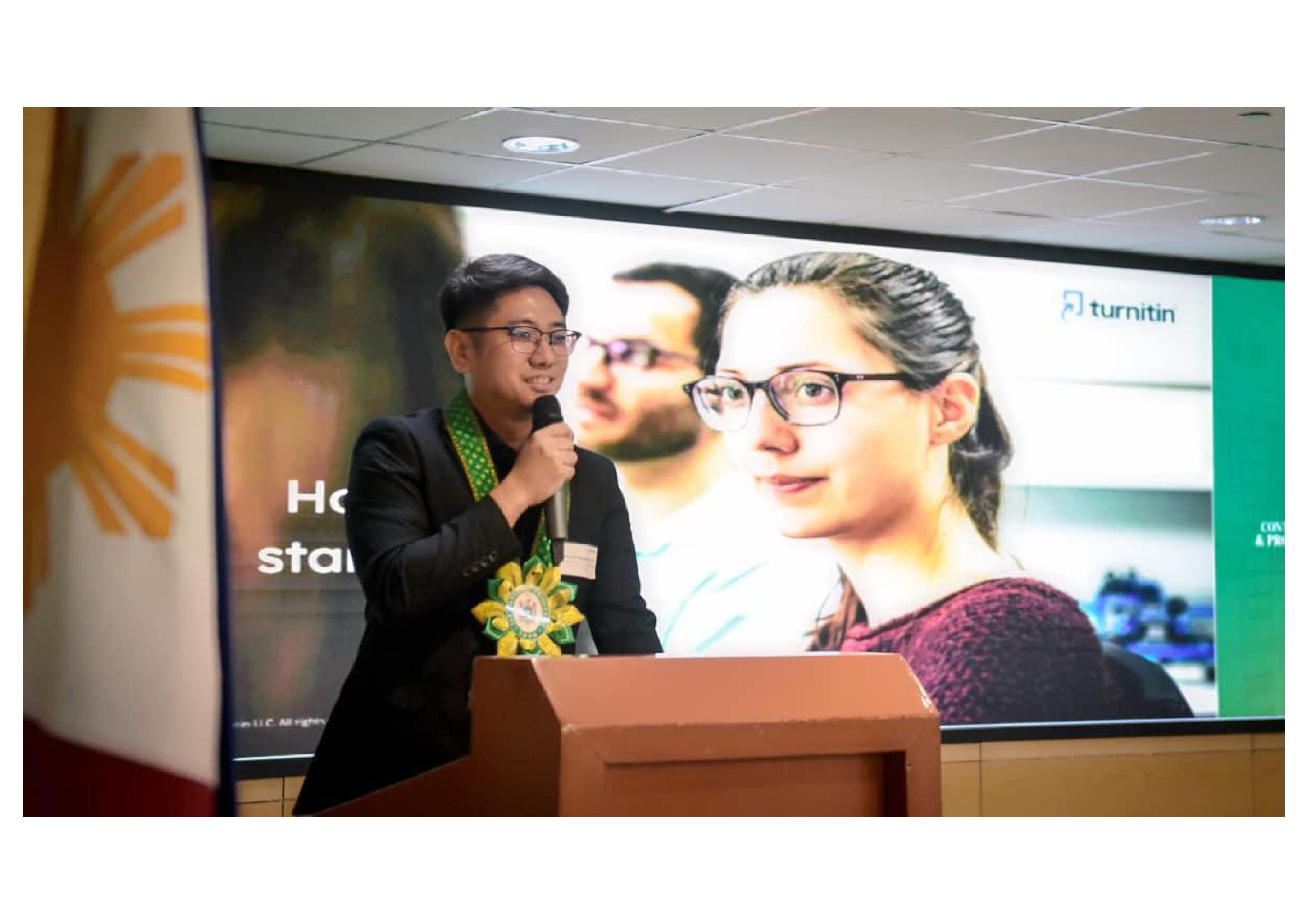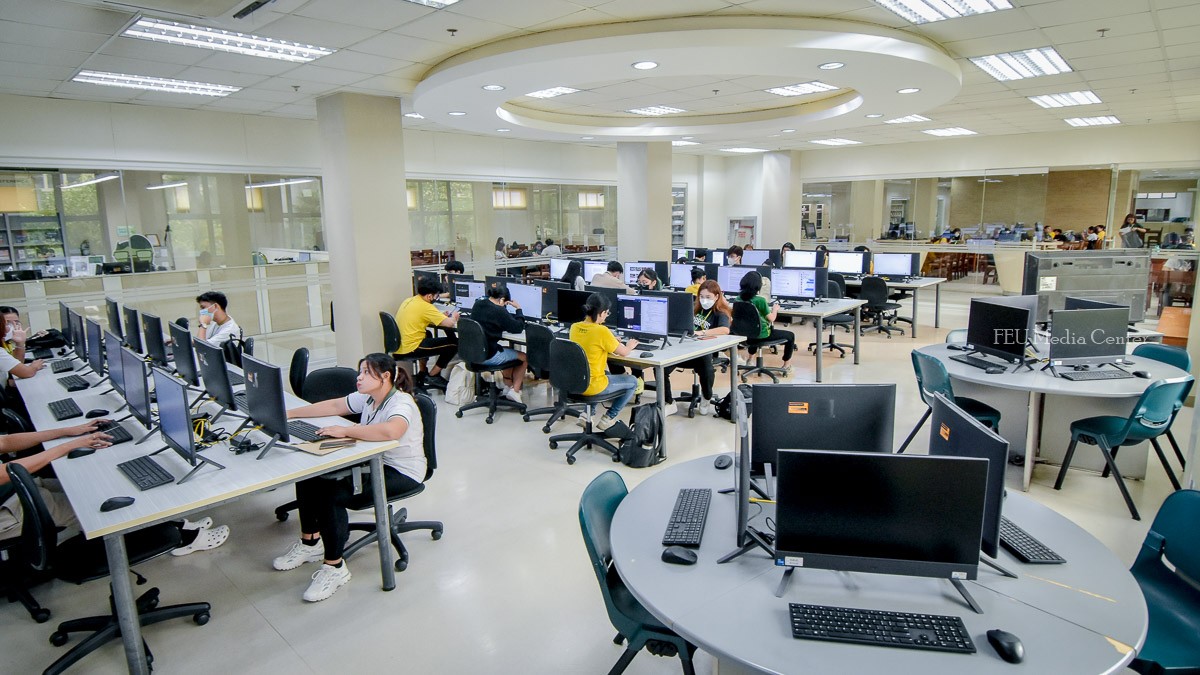Faculty members from different institutes gather to explore the intersections of generative AI and Outcomes-Based Education during a meeting. Photo by CLEARS
The recent Faculty Council meeting last Feb. 16 at the Multi-Purpose Room in the Administration Building marked a pivotal moment in the institution’s commitment to educational excellence and technological innovation. Among the agenda were guidelines on outcomes-based education (OBE) and the use of generative Artificial Intelligence (AI).
Emerging as a cornerstone in modern pedagogy, OBE emphasizes the importance of defining clear learning outcomes and aligning instructional practices to achieve these objectives.
Academic Affairs Office coordinator Achilles Alfred Ferranco and General Education director Joseph Jintalan were among the speakers who graced the event alongside Center for Learning Enrichment and Research for Students director Marko Antonio Da Silva and Graciel Lintag of the Center for Teaching and Learning.
Educators engaged in discussions on refining and implementing OBE guidelines tailored to meet the evolving needs of diverse learners. Central to these deliberations was the recognition of OBE’s potential to foster critical thinking, problem-solving skills, and holistic student development. By embracing OBE principles, the institution reaffirmed its commitment to cultivating a dynamic learning environment that empowers students to thrive in an ever-changing world.

Simultaneously, the Faculty Council addressed the integration of generative AI within educational contexts. Recognizing the transformative potential of AI in enhancing teaching and learning experiences, educators deliberated on ethical considerations and guidelines surrounding its utilization. Amid the excitement for the possibilities that AI presents, the council underscored the importance of safeguarding academic integrity, privacy, and equity. By delineating clear guidelines on the responsible use of generative AI, the institution seeks to harness its capabilities ethically while mitigating potential risks.
Moreover, the dialogue surrounding generative AI extended beyond ethical considerations to explore its practical applications in pedagogy. Educators envisioned leveraging AI-driven tools to personalize learning experiences, facilitate adaptive instruction, and foster creativity among students. From generating custom learning materials to supporting individualized feedback mechanisms, the integration of generative AI holds promises in revolutionizing traditional educational paradigms.
As the Faculty Council deliberated on these topics, a consensus emerged regarding proactive engagement with educational innovations while upholding ethical standards and pedagogical best practices. By embracing OBE and establishing clear guidelines for the ethical integration of generative AI, the institution reaffirmed its commitment to advancing educational excellence in alignment with evolving societal needs.
The Faculty Council meeting showed the institution’s proactive stance toward educational advancement and technological integration. Through meaningful discourse and collaborative decision-making, educators reaffirmed their dedication to fostering a learning environment that empowers students to excel academically, ethically, and innovatively in the digital age.
Teaching center mounts PATH
In the ever-evolving landscape of higher education, the role of faculty members extends far beyond the dissemination of information. Today, educators are tasked with fostering critical thinking, nurturing creativity, and instilling a passion for lifelong learning in their students. Recognizing the need to support faculty in this endeavor, the Center for Teaching and Learning (CTL) is introducing the Program for the Advancement of Teaching and Holistic Learning (PATH).
The PATH represents a transformative journey for tenure track faculty members in Far Eastern University. It stands as a testament to its commitment to excellence in teaching and learning. Designed as a 12-unit course spanning four semesters, PATH serves as a comprehensive platform for faculty development. It equips educators with the pedagogical tools, strategies, and insights necessary to navigate the complexities of modern education effectively.

As FEU embarks on the second semester of PATH for the academic year 2023-2024, the focus shifts toward the fundamental pillars of teaching and learning paradigm and teacher professionalism. This module is crafted to empower faculty members with a deep understanding of contemporary educational theories and methodologies. Through a combination of interactive sessions, workshops, and collaborative activities, participants delve into topics such as learner-centered approaches, inclusive teaching practices, assessment strategies, and fostering a culture of continuous improvement.
Furthermore, the module emphasizes teacher professionalism. Participants engage in reflective exercises, exploring their roles as educators within the broader academic community. They examine ethical considerations, develop effective communication skills, and explore avenues for professional growth and advancement.
By nurturing a sense of professional identity and responsibility, PATH ensures that faculty members are not only proficient in their subject matter but also adept at creating meaningful learning experiences for their students.
The sessions are held every Wednesday from 4:30 p.m. to 7:30 p.m. at the Interactive Room, ADB 207. This state-of-the-art facility serves as a hub for collaborative learning and innovation. Equipped with cutting-edge technology and a conducive learning environment, the Interactive Room fosters engagement, interaction, and dialogue among participants. It symbolizes FEU’s commitment to providing faculty members with the resources and support they need to excel in their roles as educators.


